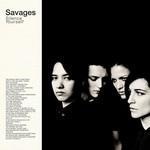
Savages Silence Yourself
(Matador)
You’ve probably heard about Savages by now. For a year or so, they’ve been the most talked about rock band in the United Kingdom. Their I Am Here EP and Flying To Berlin b/w Husbands single provided a dose of raw energy that is becoming increasingly rare in the guitar world. Their intensity was so high that it didn’t even matter that their best song shamelessly stole the bassline from Joy Division’s Colony, and that their next had a fairly large resemblance to the chorus of Patti Smith’s Horses, because Savages rocked in the most basic sense of the word.
With Silence Yourself, they still do, but much harder, and with purpose to match the intensity. Savages wear their purpose on their sleeve, quite literally. The lyrics of the first song, appropriately titled Shut Up, are printed on the front of the CD/vinyl, and throughout the album, they make extensive use of second-person lyrics. Jehnny Beth enjoys singing about how “I” am a lot better than “you,” because “you” need to be a lot more attentive and focused. “Your eyes dehumanize,” she sings on the early highlight City’s Full, and on Hit Me she asks “you” to tell her she’s miserable and that she took a beating. Sometimes it’s not entirely clear what she means, as in Shut Up, when she compares herself to a “bullet to the sun,” and the overwhelming vagueness on most songs alternates between effective in a general, alienated sense and irritatingly vague (and in the age commodified punk, overstated). But for the most part, the images create a visceral shock that enables Savages' mission statement, one that becomes clear on the album’s closing duo, a new recording of Husbands, where Beth sings of not recognizing or remembering the man who sleeps next to her, and Marshal Dear, which at its most innocent is euthanasia, but is more likely the liberating murder of the previous song’s husband character.
As much as the lyrics affirm the band’s oft-repeated mission statement, it’s the abrasive music that turns Silence Yourself from an interesting, artistic-political statement into a formidable one. Fay Milton and Ayse Hassan, on drums and bass, respectively, are one of the most formidable “rhythm” sections in post-punk since Gang of Four. From I Am Here, Milton’s precision brings the song into a hypnotic rhythm that she maintains for the duration of the album, and Hassan’s bass is often the driving force of a song, particularly in City’s Full and Husbands. To speak simply for a moment, these are some of the best bass lines you will hear all year, maybe longer than that. Gemma Thompson’s guitar, then, interrupts with brutal bursts of noise that take the album far from Joy Division and closer to Public Image Ltd or Siouxsie and the Banshees. But Savages can switch it up once in a while, and when Thompson composes hooks in addition to just capturing the band’s ferocious drive, the results, notably She Will, can be among the best on the album. She Will begins with 2013’s most arresting guitar hook and develops with threatening and duplicitous lyrics, then transforms its chorus from minimal, trembling with a steady hi-hat beat, to a perfect storm of thundering bass and violent guitars as Beth again screams apocalyptically over the overpowering cacophony. Throw in the careful manipulation of dynamics and constantly impending climax, all within a familiar pop structure, and you have Savages at their best.
In fact, the latter half of Silence Yourself in particular is Savages at their best. Thompson’s guitar bursts are at their most effective - Hit Me is a dose of adrenaline that can stop/start on a dime, the album falls into a high-octane groove, every beat of Milton’s drums reverberates with an added sense of purpose, and the album’s two most diverse moments, the ambient, wordless interlude Dead Nature and the piano-driven closer, the aforementioned Marshal Dear, provide an ambitious push. Not only do these tracks elevate Savages to more than just post-punks for the generation that missed post-punk, but they also bring the sludgy Waiting For A Sign, and the creepy, intimidating Dead Nature matches tones with the album’s opening (taken from John Cassavetes’ film Opening Night), bringing even the stranger moments into perspective and set up for the guitar-heavy second half. Husbands may be the centerpiece, but it’s these more adventurous moments and a daring closer that not only hold Silence Yourself together in a thematic sense but also bring something new to the table, making even the few less immediate moments of the album equally important. Indeed, Silence Yourself is more than just this year’s best debut record so far and even more than one of the best records of any kind this year. It could be the closest post-punk has come to full-bodied artistry since Interpol took their own post-punk influences and gave us Turn On The Bright Lights all those years ago.
15 May, 2013 - 04:13 — Forrest Cardamenis